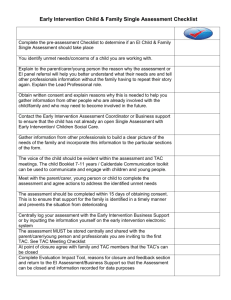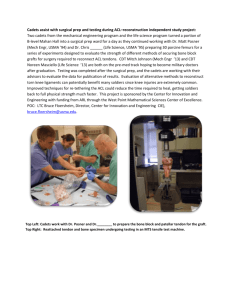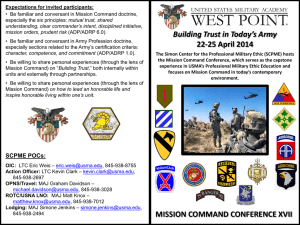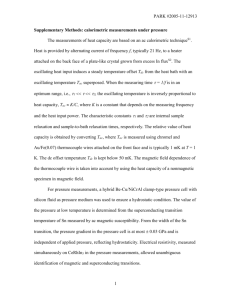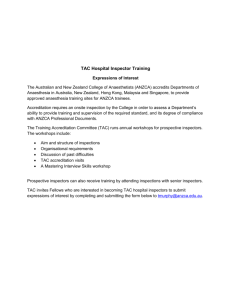TAC “featured member” interview questions
advertisement
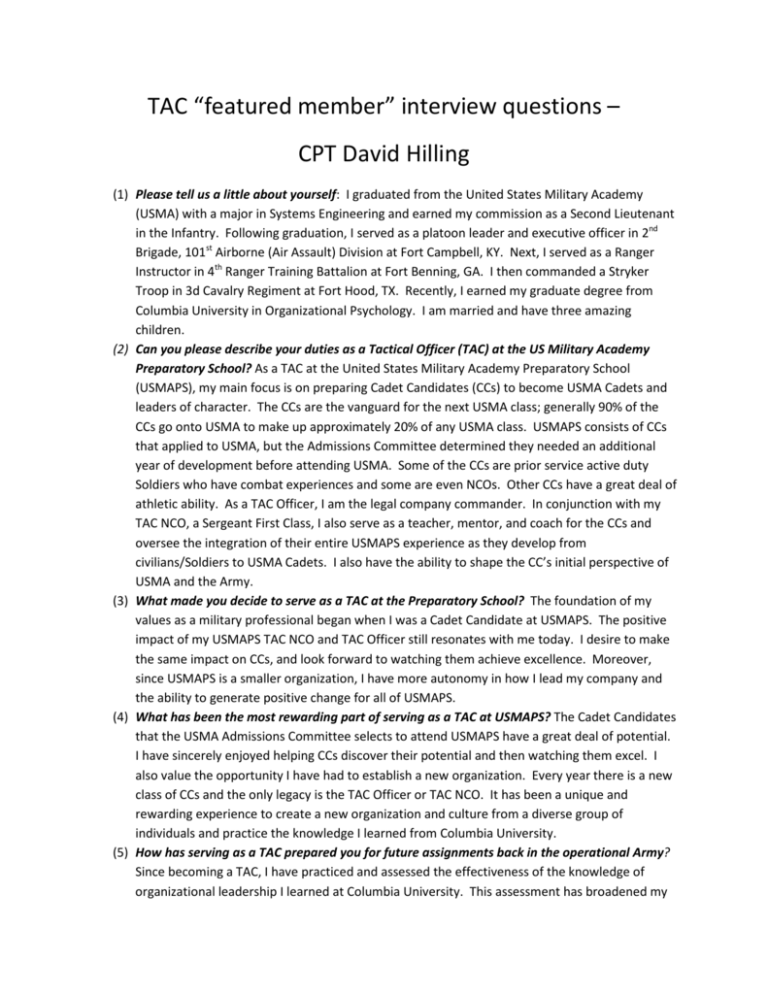
TAC “featured member” interview questions – CPT David Hilling (1) Please tell us a little about yourself: I graduated from the United States Military Academy (USMA) with a major in Systems Engineering and earned my commission as a Second Lieutenant in the Infantry. Following graduation, I served as a platoon leader and executive officer in 2nd Brigade, 101st Airborne (Air Assault) Division at Fort Campbell, KY. Next, I served as a Ranger Instructor in 4th Ranger Training Battalion at Fort Benning, GA. I then commanded a Stryker Troop in 3d Cavalry Regiment at Fort Hood, TX. Recently, I earned my graduate degree from Columbia University in Organizational Psychology. I am married and have three amazing children. (2) Can you please describe your duties as a Tactical Officer (TAC) at the US Military Academy Preparatory School? As a TAC at the United States Military Academy Preparatory School (USMAPS), my main focus is on preparing Cadet Candidates (CCs) to become USMA Cadets and leaders of character. The CCs are the vanguard for the next USMA class; generally 90% of the CCs go onto USMA to make up approximately 20% of any USMA class. USMAPS consists of CCs that applied to USMA, but the Admissions Committee determined they needed an additional year of development before attending USMA. Some of the CCs are prior service active duty Soldiers who have combat experiences and some are even NCOs. Other CCs have a great deal of athletic ability. As a TAC Officer, I am the legal company commander. In conjunction with my TAC NCO, a Sergeant First Class, I also serve as a teacher, mentor, and coach for the CCs and oversee the integration of their entire USMAPS experience as they develop from civilians/Soldiers to USMA Cadets. I also have the ability to shape the CC’s initial perspective of USMA and the Army. (3) What made you decide to serve as a TAC at the Preparatory School? The foundation of my values as a military professional began when I was a Cadet Candidate at USMAPS. The positive impact of my USMAPS TAC NCO and TAC Officer still resonates with me today. I desire to make the same impact on CCs, and look forward to watching them achieve excellence. Moreover, since USMAPS is a smaller organization, I have more autonomy in how I lead my company and the ability to generate positive change for all of USMAPS. (4) What has been the most rewarding part of serving as a TAC at USMAPS? The Cadet Candidates that the USMA Admissions Committee selects to attend USMAPS have a great deal of potential. I have sincerely enjoyed helping CCs discover their potential and then watching them excel. I also value the opportunity I have had to establish a new organization. Every year there is a new class of CCs and the only legacy is the TAC Officer or TAC NCO. It has been a unique and rewarding experience to create a new organization and culture from a diverse group of individuals and practice the knowledge I learned from Columbia University. (5) How has serving as a TAC prepared you for future assignments back in the operational Army? Since becoming a TAC, I have practiced and assessed the effectiveness of the knowledge of organizational leadership I learned at Columbia University. This assessment has broadened my (6) (7) (8) (9) intellectual and leadership abilities. Additionally, the USMA Staff and Faculty consist of some of the Army’s greatest thinkers and leaders. I have been intentional in seeking their wisdom on how to be a successful field grade officer. What was your graduate school experience like at Teachers College – Columbia University? Due to my military career, I have generally surrounded myself with people who think like me and have a similar worldview to me. However, my experiences at Columbia University exposed me to very diverse people, and I learned to appreciate different worldviews. Columbia also provided me the opportunity to spend a year reflecting on the challenges and decisions I faced as a company grade officer. I was then able to apply these reflections to organizational and leader development models and theories and challenge myself to think unconventionally. How has this assignment been in terms of family time and work-life balance? During graduate school and as a TAC, I have had the best balance of family time and work-life balance in my army career. My family has enjoyed cheering on the Army Team at various Division 1 Athletics and visiting all the sites of the Hudson Valley and NYC. What advice would you give to officers who are considering applying to become a TAC at the Preparatory School? Being a USMAPS TAC is an ideal opportunity if you value developing a group of highly motivated individuals. To ensure you are the best leader developer for the Cadet Candidates, you will have the opportunity to earn a phenomenal graduate degree. Yet, a key component to be accepted is quantifiable scores. You cannot change you undergraduate transcripts; but you can achieve an excellent GRE score. I would recommend studying hard for the GRE. Anything else you’d like to share? As a TAC at USMAPS, I am also connected to USMA and invest in cadets. I serve as an OIC for the West Point Parachute Team and mentor cadets through Officer Christian Fellowship. I also teach the 1st Class Cadets their capstone military science class, MX400. Both USMA and USMAPS provide me complementing developmental opportunities for the Army’s next generation of leaders.
